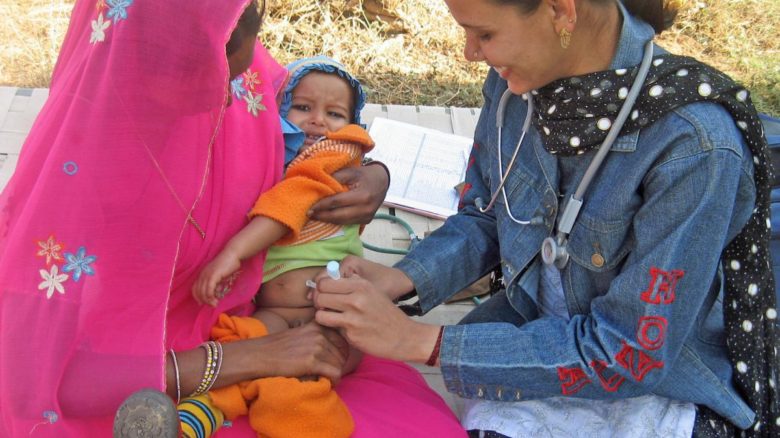Legacy Projects
Over the last 50 years, Population Foundation of India has engaged in and supported field level work, as well as research that has yielded practical insights for enriching policy. Through the years some of our legacy projects have seen the organisation go from advocacy to action.
Global Fund Project
The Global Fund to fight AIDS, Tuberculosis and Malaria (GFATM) provided funding to India for antiretroviral treatment (ART), and access to care and support services for people living with HIV/AIDS (PLHIV). Population Foundation of India was the first civil society organisation to be a Principal Recipient of the Global Fund grants in India, and worked on HIV/AIDS with the hope of one day integrating it within the broader context of maternal and child health. PFI covered 14 states under the Global Fund’s Round 4 and 6 HIV/AIDS programmes. Population Foundation of India complemented the government’s efforts to mitigate the public health challenge posed by HIV/AIDS through an integrated health and social support mechanism.
Health of the Urban Poor
Health of the Urban Poor (HUP) was a technical assistance programme implemented by a consortium of development organisations steered by Population Foundation of India. It sought to address acute health vulnerability of poor urban communities by improving the delivery and utilisation of maternal, child health and nutrition services, and promoting water supply, sanitation and hygiene services. The programme involved a bilateral grant approved by the Government of India, and was originally planned to run for four years (2009-2013). Based on mid-term recommendations, HUP was extended up to 2015 to overlap with the launch of the National Urban Health Mission (NUHM) in 2013, and facilitate its rollout. Technical and implementation partners led by Population Foundation of India assisted Central and eight state governments in designing and implementing this first-ever public urban health programme. Some of the outcomes of the programme include formation of women’s groups at the community level, implementation of urban health and nutrition days (UHND), city health planning (CHP), and establishment of city coordination committees (CCC) as convergent platforms for implementing the NUHM. Four of the five scale-up approaches from the programme have been incorporated into the NUHM framework.

Scaling Up Framework
Global and Indian experiences show that very few innovative projects go all the way to effective large-scale implementation with impact. One of the reasons for this is the implicit assumption that scaling up happens spontaneously, and actual large-scale implementation is often taken for granted. What is often missing is the adoption of a systematic approach to scale up proven interventions, including at the planning stage of a project. The Population Foundation of India, in partnership with Management Systems International (MSI), adopted the Scaling Up Management (SUM) Framework in 2006 and has since been applying it to scale up NGO and government-led innovations and pilots in health and nutrition in India. We have trained over 500 senior management staff from donors, implementation organizations, and the government We also guided and mentored 15 NGO and government-led pilots that met the scalability assessment criteria and provided need-based support in systematically planning for scaling up. The prominent ones include:
- Home-Based Neo-Natal Care, Society for Education Action and Research in Community Health (SEARCH)
- Increasing Age of First Conception and Birth Spacing, Institute of Health Management (IHMP) Pachod
- Community-Based Health Insurance, Self Employed Women’s Association (SEWA)
- NGO Management of Public Primary Health Care Centres, Karuna Trust
- Training of District Medical Officers in Emergency Obstetric Care (EMOC), Federation of Obstetric and Gynecological Societies of India (FOGSI)
- Improving Maternal Health through Improving Decentralized Governance, Community Health Care Management Initiative (CHCMI), Department of Panchayats & Rural Development Department, Government of West Bengal
- Community Action for Health (CAH) under the National Health Mission (NHM), Advisory Group on Community Action (AGCA)
Strengthening Community Action for Health under the National Health Mission
Community Action for Health (CAH) is one of the key pillars of the National Health Mission (NHM), the flagship program of the Government of India. To provide guidance on CAH, the Ministry of Health and Family Welfare (MoHFW) constituted the Advisory Group on Community Action (AGCA) comprising eminent health experts. Population Foundation of India hosted its Secretariat through a government order from 2005 to 2023.
The CAH program evolved from a pilot in nine states to becoming the world’s largest community-action initiative, reaching 230,000 villages and 145 cities across 25 states. Over this journey, the Secretariat worked closely with the MoHFW and National Health Systems Resource Center (NHSRC) to develop national guidelines and resources on community action; trained over 50,000 state, district, and block government officials and civil society organizations; and organized more than 3,000 Jan Samwads (Public Dialogues) for the community to share feedback, voice their concerns, and seek redressal. This significantly enhanced healthcare accessibility and reduced the cost of care through active community involvement, thereby ‘Bringing Public into Public Health’.
The AGCA played a crucial role in providing feedback on ground-level issues through participation in the Common Review Mission (CRM). It also conducted fact-finding missions following health crises in Madhya Pradesh and Chhattisgarh, which influenced policies and programming.
In 2023, the AGCA transitioned its technical support role to NHSRC, which continues to foster community action under the NHM.
More details on CAH can be accessed here: CAH
Rajasthan
Set up in 2018, Population Foundation of India’s Rajasthan office had steadily made its presence felt among key stakeholders and was at the forefront of strategic engagement for adolescent and youth issues in the state. The office also played an important role in outreach and training in reproductive and sexual health of adolescents in Bundi, Dungarpur, Karauli and Tonk districts of the state.
